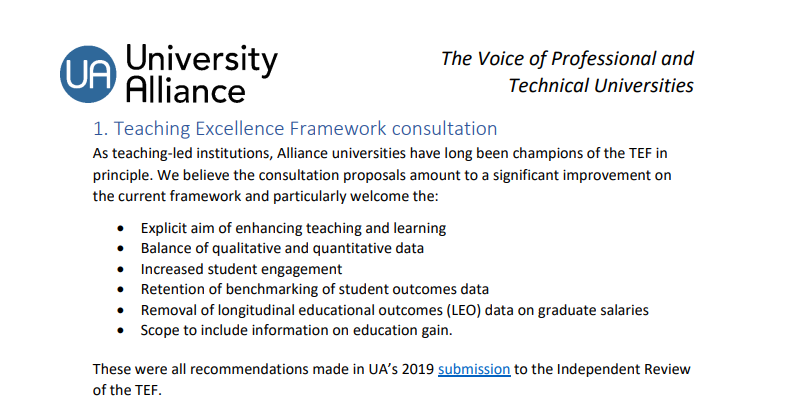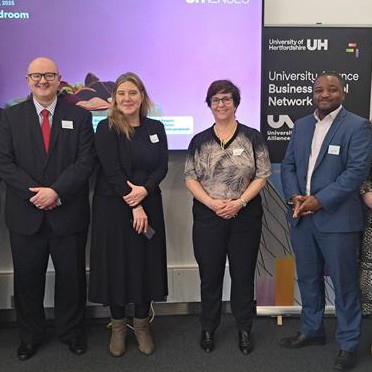Government proposals on quality in higher education could ‘wreak havoc on the levelling up agenda’: University Alliance responds to Office for Students consultations
University Alliance [UA] has today [Wednesday 16 March 2022] responded to three consultations launched by the Office for Students [OfS] on 20 January 2022.
The consultations sought views on a range of proposals relating to the way quality in university teaching is measured and regulated. Proposals included using graduate outcomes as a measure of quality which would be used to inform regulatory action. They also covered changes to the Teaching Excellence Framework, which is the government’s ranking system for university teaching quality.
The University Alliance is gravely concerned that the proposals outlined by government could have unintended consequences for the least privileged students in society.
In its response, the University Alliance, which represents the UK’s leading professional and technical universities, welcomes:
- that the OfS will take a provider’s context into account when assessing its performance. As part of this, they must accept information pertaining to education gain (value added), student voice and geographical labour markets as evidence of a provider’s achievement of positive student outcomes
- the proposed changes to the way teaching excellence is assessed through the Teaching Excellence Framework. In particular, we are pleased to see the introduction of a student submission. The Office for Students should update the awards categories it uses in the TEF to reflect this new era of teaching excellence assessment. We recommend categories proposed by the Independent Review of TEF: Outstanding, Highly Commended, and Commended. These are clear categories that are widely used outside the higher education sector.
But University Alliance also makes the following recommendations, that:
- OfS should create an additional bank of graduate-level jobs that more accurately reflect what career success looks like in the modern day. The categorisation currently being proposed is only updated every ten years and risks being out of date and not accurately reflecting positive career outcomes in sectors such as the creative arts, agriculture and enterprise.
- Only those providers at greatest risk of non-compliance should be prioritised for assessment, and the OfS should ensure its prioritisation policy is public and transparent to avoid any suggestion of politicisation or bias.
- The Teaching Excellent Framework submission window should be delayed to late winter or spring 2023 to allow for updated data to be used.
Debra Humphris, the University Alliance chair, said:
“As innovators in teaching and learning, Alliance universities share the government’s commitment to ensuring that our courses deliver the very best quality for students, communities and employers. However, recent proposals risk having the opposite effect.
For every minute of staff time that goes in to responding to consultations, gathering data and reporting on outcomes, a minute less can be spent on teaching, student support and research. Adding to this administrative burden, while also cutting university funding by stealth through a tuition fee freeze, is unlikely to lead to an increase in quality.
We are calling on government to take a broader view of what a positive graduate outcome looks like. The job a person holds fifteen months after graduating can be influenced by any number of economic, social and geographical factors as well as the choice of the individual. Any measures that would disproportionately affect universities in areas where there are already fewer job opportunities would wreak havoc on the government’s levelling up agenda.
We welcome proposed reforms to the Teaching Excellence Framework, especially proposals to increase student engagement. Any serious attempt to measure and improve quality in higher education should engage those it serves.”




